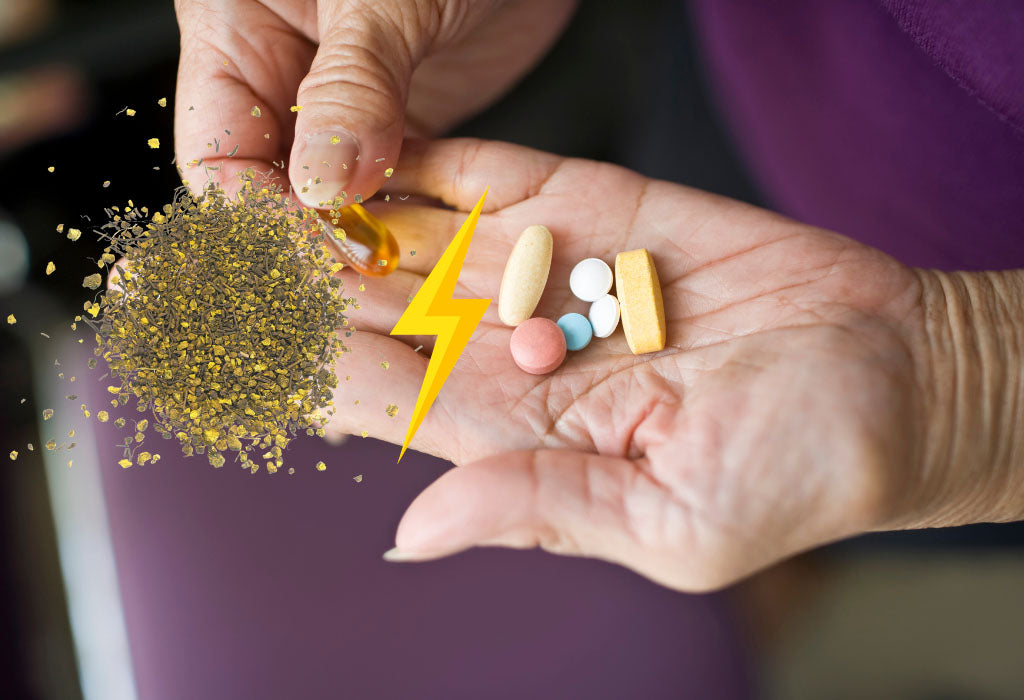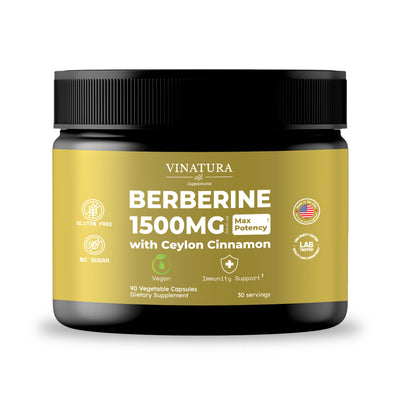
Goldenseal Interactions: Everything to Know Before Taking It
Goldenseal, a revered herbal remedy, boasts numerous health benefits but necessitates caution due to its potential toxicity when mixed with certain medications. This article explores Goldenseal's drug interactions, guiding readers toward safe supplementation practices.
Before exploring further, please read the disclaimer located at the end of this webpage.
What Is Goldenseal, And How Is It Used?
Goldenseal (Hydrastis canadensis L.), a perennial herb native to the rich hardwood forests of the northeastern United States and Canada, belongs to the Ranunculaceae family.
Esteemed for its medicinal properties, Goldenseal has been utilized historically to treat a wide array of health issues.
Its effectiveness spans addressing gastric inflammation, ulcers, muscle and intestinal inflammation, urinary disorders, and respiratory ailments, among other conditions.
Furthermore, Goldenseal is cited for its benefits in managing nervous and menstrual discomforts, liver congestion, constipation, blood clotting issues, skin and eye infections, diarrhea, and even contributing positively to the fight against certain cancers [5].
The versatility of Goldenseal is also reflected in its available forms - from dried roots and alcohol extracts to fluid extracts and tinctures.
This diversity in forms not only illustrates Goldenseal's extensive therapeutic use but also makes it accessible for a variety of therapeutic applications [4].
This video will give you comprehensive benefits and a guide to using Goldenseal root supplements before you explore the medications that goldenseal interferes with:
What Medications Does Goldenseal Interfere With?
Medications Metabolized By The Liver
Goldenseal is rich in health-promoting isoquinoline alkaloids but raises potential concerns regarding interactions with other medications metabolized by the liver.
Research suggests that goldenseal alkaloids - berberine and hydrastine can inhibit liver enzymes CYPs 2C9, 2D6, and 3A4/5, potentially affecting the metabolism of various medications [6].
This interaction could increase these medications' levels in the bloodstream, intensifying excessively their effectiveness and risk of adverse effects.
Therefore, individuals using medications that undergo extensive liver metabolism should proceed with caution and consult a healthcare professional before adding Goldenseal to their routine.
Blood Thinners

While there is no direct study on drug interactions between blood thinner medications and Goldenseal, there has been research on the interaction between berberine - a key component in Goldenseal - and warfarin, a widely used blood thinner.
This study reveals that berberine has the potential to significantly affect blood clotting by reducing the serum protein binding rate of warfarin [2, 9].
This effect could counteract the blood-thinning properties of warfarin, thereby impacting its efficacy in preventing blood clots.
On the contrary, there are also mentions of a synergistic effect when Goldenseal and blood thinner medications are combined, potentially leading to an increased risk of bleeding or bruising.
Despite the ongoing debate, the prevailing advice is for individuals on blood thinner medications to exercise caution before supplementing their diet with Goldenseal.
Sedatives

When incorporating Goldenseal with sedatives, it's crucial to be aware of its potential neurotoxic effects. Goldenseal includes hydrastine, a component known to harm neural health.
In detailed studies with PC12 precursor nerve cells - chosen for their similarity to human neural cells in neurotransmitter secretion and ion receptor functionality - hydrastine showed a troubling ability to reduce the survival of these cells.
Even at low doses of 500µM, hydrastine was toxic, posing a risk to nerve precursor cells [5].
This interaction implies that Goldenseal, especially with its hydrastine content, could compromise the effectiveness of sedatives by impacting the cellular environments they target.
Digoxin And Cyclosporine
Goldenseal's interaction with medications like digoxin and cyclosporine is a critical concern for individuals managing heart failure and medication effectiveness.
Both digoxin and cyclosporine are metabolized by the P-Glycoprotein (P-gp) transporter, which is vital for drug bioavailability and toxicity regulation.
Importantly, berberine, a key compound in Goldenseal, has been shown to inhibit the P-gp transporter.
This inhibition could elevate digoxin and cyclosporine drug levels, increasing the risk of heightened efficacy and potential toxicity [7].
Therefore, patients on digoxin or cyclosporine should be cautious and consider avoiding Goldenseal supplementation unless closely monitored by medical professionals.
Indinavir
Indinavir, a crucial protease inhibitor in the management of HIV/AIDS, primarily undergoes liver metabolism through the action of the enzyme CYP3A4.
The simultaneous use of Goldenseal with CYP3A4 metabolized drugs has been under scrutiny due to potential alterations in drug metabolism prompted by Goldenseal's influence on this enzyme system.
However, a focused study addressing the pharmacokinetic effects of Goldenseal root on Indinavir provided notable insights.
Results revealed that Goldenseal does not significantly alter the elimination half-life or the time it takes for Indinavir to reach its peak concentration in the plasma [8].
This finding suggests a degree of safety in the concurrent use of Goldenseal with Indinavir, indicating that patients treating HIV/AIDS with Indinavir may not need to avoid Goldenseal supplementation based on concerns of adverse pharmacokinetic interactions.
Important Things To Note Before Taking Goldenseal
Individuals with heart disease, diabetes, and high blood pressure should avoid using Goldenseal despite its many health benefits.
Pregnant or breastfeeding women, as well as children under 12, should also steer clear of Goldenseal due to insufficient safety data and its potential uterine-stimulating effects.
How To Take Goldenseal Without Interactions
Goldenseal has been found to inhibit crucial metabolic enzymes, CYP2D6 and CYP3A4, which play a key role in processing more than half of the drugs available.
Healthcare professionals are strongly cautioned against combining Goldenseal with most medications.
If considering supplementation, it is advisable to seek guidance from a healthcare provider to ensure the correct dosage and to mitigate potential adverse effects.
The recommended daily dosages are 2g of powder, 8 mL of tincture, or 2 mL of fluid extract [4].
Frequently Asked Questions
What are Some Signs of a Goldenseal Interaction?
Reported signs like breathing difficulties, itching, and rash indicate a need to stop using Goldenseal and seek professional evaluation.
Are There Any Alternatives to Goldenseal?
As berberine is the main active component, exploring alternatives rich in berberine, like Chinese goldthread, barberry, yellow root, and Oregon grape, is recommended.
Conclusion
While Goldenseal is recognized for its health advantages, its ability to interact with medications by inhibiting crucial metabolic enzymes requires a cautious approach.
Goldenseal's potential to alter drug efficacy underscores the importance of consulting healthcare professionals before incorporating it into one's regimen.
Therefore, making informed decisions with professional guidance can ensure the safe use of Goldenseal alongside medications, allowing individuals to benefit from its properties without risking adverse interactions.
References
- [1] Asher, G., Corbett, A., & Hawke, R. (2017). Common Herbal Dietary Supplement- Drug Interactions. 96(2).
- [2] Chadha, R. M., & Egan, B. J. (2018). Perioperative Considerations of Herbal Medications. Current Clinical Pharmacology, 12(3), 194–200. https://doi.org/10.2174/1574884712666170913160205
- [3] Jellin, J. M. (n.d.). Natural medicines comprehensive database. (No Title). Retrieved March 10, 2024, from https://cir.nii.ac.jp/crid/1130282273197310848
- [4] Mahady, G. B., & Chadwick, L. R. (2001). Goldenseal (Hydrastis canadensis): Is There Enough Scientific Evidence to Support Safety and Efficacy?. Nutrition in Clinical Care, 4(5), 243–249. https://doi.org/10.1046/j.1523-5408.2001.00004.x
- [5] Mandal, S. K., Maji, A. K., Mishra, S. K., Ishfaq, P. M., Devkota, H. P., Silva, A. S., & Das, N. (2020). Goldenseal (Hydrastis canadensis L.) and its active constituents: A critical review of their efficacy and toxicological issues. Pharmacological Research, 160, 105085. https://doi.org/10.1016/j.phrs.2020.105085
- [6] McDonald, M. G., Tian, D.-D., Thummel, K. E., Paine, M. F., & Rettie, A. E. (2020). Modulation of Major Human Liver Microsomal Cytochromes P450 by Component Alkaloids of Goldenseal: Time-Dependent Inhibition and Allosteric Effects. Drug Metabolism and Disposition, 48(10), 1018–1027. https://doi.org/10.1124/dmd.120.091041
- [7] Qiu, W., Jiang, X. H., Liu, C. X., Ju, Y., & Jin, J. X. (2009). Effect of berberine on the pharmacokinetics of substrates of CYP3A and P‐gp. Phytotherapy Research, 23(11), 1553–1558. https://doi.org/10.1002/ptr.2808
- [8] Sandhu, R. S., Prescilla, R. P., Simonelli, T. M., & Edwards, D. J. (2003). Influence of Goldenseal Root on the Pharmacokinetics of Indinavir. The Journal of Clinical Pharmacology, 43(11), 1283–1288. https://doi.org/10.1177/0091270003258660
- [9] Zhuang, W., Liu, S., Zhao, X., Sun, N., He, T., Wang, Y., Jia, B., Lin, X., Chu, Y., & Xi, S. (2021). Interaction Between Chinese Medicine and Warfarin: Clinical and Research Update. Frontiers in Pharmacology, 12. https://doi.org/10.3389/fphar.2021.751107
Author

Product Disclaimer
The dietary supplement products mentioned on this website are formulated based on scientific research and adhere to FDA guidelines for dietary supplements. However, the content of the articles has not been evaluated by the Food and Drug Administration (FDA) and is not intended to promote or endorse any specific product. Any products sold on this website are not intended to diagnose, treat, cure, or prevent any disease.
Opinions and Endorsements
Any claims, statements, or opinions expressed in the articles are those of the author(s) and do not necessarily reflect the views or opinions of the manufacturers of the dietary supplement products. The products sold on this website are separate from the content of the articles and are not directly endorsed or associated with the information presented here.
Liability Disclaimer
The author(s) of the articles, website, and manufacturers of the dietary supplement products do not assume any liability for any potential consequences arising from the use of the information provided in the articles. It is recommended that individuals consult with a qualified healthcare professional before making any dietary or lifestyle changes, including the use of dietary supplements.
Product Usage
Please refer to the product labels and packaging for specific usage instructions and guidelines for the dietary supplement products sold on this website.
Customer Support
For any concerns or questions regarding the dietary supplement products, please contact our customer support team, who will be more than happy to assist you.





Leave a Comment
Be the first to comment.
What do you think?